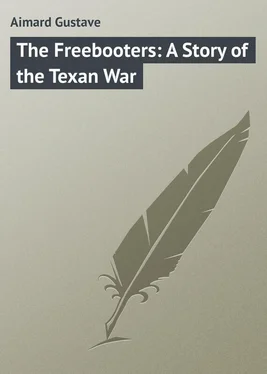Gustave Aimard - The Freebooters - A Story of the Texan War
Здесь есть возможность читать онлайн «Gustave Aimard - The Freebooters - A Story of the Texan War» — ознакомительный отрывок электронной книги совершенно бесплатно, а после прочтения отрывка купить полную версию. В некоторых случаях можно слушать аудио, скачать через торрент в формате fb2 и присутствует краткое содержание. Жанр: foreign_prose, на английском языке. Описание произведения, (предисловие) а так же отзывы посетителей доступны на портале библиотеки ЛибКат.
- Название:The Freebooters: A Story of the Texan War
- Автор:
- Жанр:
- Год:неизвестен
- ISBN:нет данных
- Рейтинг книги:3 / 5. Голосов: 1
-
Избранное:Добавить в избранное
- Отзывы:
-
Ваша оценка:
- 60
- 1
- 2
- 3
- 4
- 5
The Freebooters: A Story of the Texan War: краткое содержание, описание и аннотация
Предлагаем к чтению аннотацию, описание, краткое содержание или предисловие (зависит от того, что написал сам автор книги «The Freebooters: A Story of the Texan War»). Если вы не нашли необходимую информацию о книге — напишите в комментариях, мы постараемся отыскать её.
The Freebooters: A Story of the Texan War — читать онлайн ознакомительный отрывок
Ниже представлен текст книги, разбитый по страницам. Система сохранения места последней прочитанной страницы, позволяет с удобством читать онлайн бесплатно книгу «The Freebooters: A Story of the Texan War», без необходимости каждый раз заново искать на чём Вы остановились. Поставьте закладку, и сможете в любой момент перейти на страницу, на которой закончили чтение.
Интервал:
Закладка:
For a long period the noise he had heard was not repeated, and the desert had fallen back into silence. But the Canadian did not deceive himself. Up to all Indian tricks, and knowing the unbounded patience of the Redskins, he continued to keep on his guard; still, as he suspected that in the darkness searching glances were fixed on him and spying his slightest movements, Tranquil yawned twice or thrice, as if overcome by sleep, drew back the hand he had laid on his rifle barrel, and pretending to be unable to resist sleep any longer, he let his head sink on his chest with a natural movement.
Nothing stirred. An hour elapsed ere the slightest rumour disturbed the silence of the forest. Still, Tranquil felt confident that he had not deceived himself. The sky grew gradually brighter, the last star had disappeared, the horizon was assuming those fiery red tints which immediately precede the appearance of the sun: the Canadian, weary of this long watching, and not knowing to what he should attribute this inaction on the part of the Redskins, resolved at last to obtain the solution of the enigma. He therefore started suddenly to his feet and took up his rifle.
At the moment he prepared to go on the discovery, a noise of footsteps near him, mingled with the rustling of leaves, and the breaking of dry branches, smote his ear.
"Ah, ah!" the Canadian muttered, "It seems they have made up their mind at last; let us see who these troublesome neighbours are."
At the same instant, a clear feminine voice rose harmoniously and sonorously in the silence. Tranquil stopped with a start of surprise. This voice was singing an Indian melody, of which this was the first verse —
"I confide my heart to thee in the name of the Omnipotent.
I am unhappy, and no one takes pity on me;
Still God is great in my eyes."
"Oh!" the hunter muttered, with a nervous quivering, "I know that song, it is that of the betrothed of the Snake-Pawnees. How is it that these words strike my ear so far from their hunting grounds? Can a detachment of Pawnees be wandering in the neighbourhood? Oh, no! That is impossible. I will see who this singer is who has awaked with the sun."
Without further hesitation, the hunter walked hurriedly toward the thicket, from the centre of which the melody had been audible. But at the moment he was about to enter it, the shrubs were quickly parted, and two Redskins entered the clearing, to the amazement of the Canadian.
On coming within ten paces of the hunter the Indians stopped, and stretched their arms out in front of them, with fingers parted in sign of peace; then, crossing their arms on their chest, they waited. At this manifestation of the peaceful sentiments of the newcomers, the Canadian rested the butt of his rifle on the ground, and examined the Indians with rapid glance.
The first was a man of lofty stature, with intelligent features and open countenance; as far as it was possible to judge the age of an Indian, this man seemed to have passed the middle stage of life. He was dressed in his full warpaint, and the condor plume, fastened above his right ear, indicated that he held the rank of a Sachem in his tribe.
The other Redskin was not a man, but a woman, twenty years of age at the most; she was slim, active, and elegant, and her dress was decorated in accordance with the rules of Indian coquetry: still, her worn features, on which only the fugitive traces of a prematurely vanished beauty were visible, shewed that, like all Indian squaws, she had been pitilessly compelled to do all those rude household tasks, the whole weight of which the men lay on them, regarding it as beneath their dignity to interfere.
At the sight of these two persons, the hunter involuntarily felt an emotion, for which he could not account; the more he regarded the warrior standing before him, the more he seemed to find again in this martial countenance the distant memory of the features of a man he had formerly known, though it was impossible for him to recall how or where this intimacy had existed; but overcoming his feelings, and comprehending that his lengthened silence must appear extraordinary to the persons who had been waiting so long for him to address to them the compliments of welcome, which Indian etiquette demands, he at length decided on speaking.
"The Sachem can approach without fear and take his seat by the fire of a friend," he said.
"The voice of the Pale hunter rejoices the heart of the Chief," the warrior answered; "his invitation pleases him; he will smoke the calumet of friendship with the Pale hunter."
The Canadian bowed politely; the Sachem gave his squaw a sign to follow him, and he crouched on his heels in front of the fire, where Loyal Heart and Lanzi were still asleep. Tranquil and the warrior then began smoking silently, while the young Indian squaw was busily engaged with the household duties and preparing the morning meal. The two men allowed her to do so, not noticing apparently the trouble she took.
There was a lengthened silence. The hunter was reflecting, while the Indian was apparently completely absorbed by his pipe. At last he shook the ash out of the calumet, thrust the stem through his belt, and turned to his host —
"The Walkon and the Maukawis," he said, "always sing the same song; the man who has heard them during the moons of spring recognizes them in the moons of winter, it is not the same with man; he forgets quickly; his heart does not bound at the recollection of a friend; and if he meet him again after many moons, his eyes do not see him."
"What does the Chief mean?" the Canadian asked, astonished at these words, which seemed to convey a reproach.
"The Wacondah is powerful," the Indian continued; "it is he who dictates the words my breast breathes; the sturdy oak forgets that he has been a frail sapling."
"Explain yourself, Chief," the hunter said, with great agitation; "the sound of your voice causes me singular emotion; your features are not unknown to me; speak, who are you?"
"Singing-bird," the Indian said, addressing the young woman, "you are the cihuatl of a Sachem; ask the great Pale hunter why he has forgotten his friend – the man who, in happier times, was his brother?"
"I will obey," she answered, in a melodious voice; "but the Chief is deceived; the great Pale hunter has not forgotten the Wah-rush-a-menec of the Snake Pawnees."
"Oh!" Tranquil exclaimed, warmly, "Are you really Black-deer, my brother? My heart warned me secretly of your presence, and though your features had almost faded from my memory, I expected to find a friend again."
"Wah! is the Paleface speaking the truth?" the Chief said, with an emotion he could not quite conceal; "Has he really retained the memory of his brother, Black-deer?"
"Ah, Chief," the hunter said, sadly; "to doubt any longer would be an insult to me; how could I suppose I should ever meet you here, at so considerable a distance from the wigwams of your nation?"
"That is true?" the Indian remarked, thoughtfully; "my brother will forgive me."
"What!" Tranquil exclaimed, "Is that charming squaw I see there, the Singing-bird, that frail child whom I so often tossed on my knee?"
"Singing-bird is the wife of a Chief," the Indian answered, flattered by the compliment; "at the next fall of the leaves forty-five moons will have passed since Black-deer bought her of her father for two mustangs and a panther skin quiver."
Singing-bird smiled gracefully at the hunter, and went on with her duties.
"Will the Chief permit me to ask him a question?" Tranquil went on.
"My brother can speak, the ears of a friend are open."
"How did the Sachem learn that he would find me here?"
"Black-deer was ignorant of it: he was not seeking the great Pale hunter; the Wacondah has permitted him to find a friend again, and he is grateful."
Читать дальшеИнтервал:
Закладка:
Похожие книги на «The Freebooters: A Story of the Texan War»
Представляем Вашему вниманию похожие книги на «The Freebooters: A Story of the Texan War» списком для выбора. Мы отобрали схожую по названию и смыслу литературу в надежде предоставить читателям больше вариантов отыскать новые, интересные, ещё непрочитанные произведения.
Обсуждение, отзывы о книге «The Freebooters: A Story of the Texan War» и просто собственные мнения читателей. Оставьте ваши комментарии, напишите, что Вы думаете о произведении, его смысле или главных героях. Укажите что конкретно понравилось, а что нет, и почему Вы так считаете.












